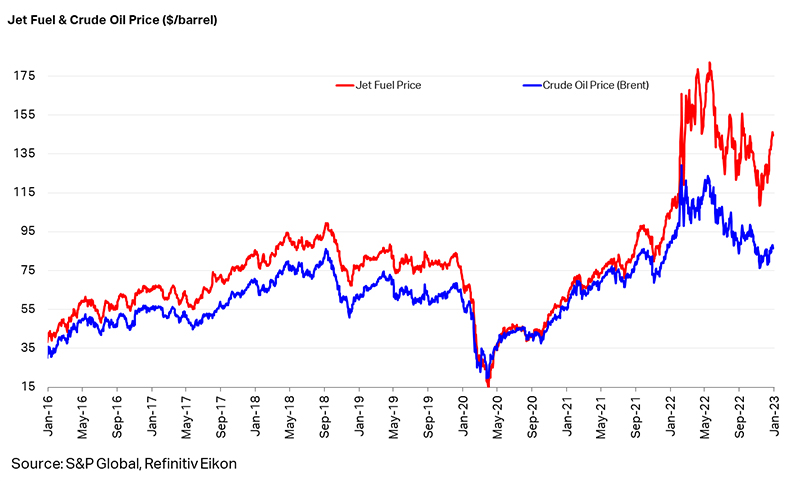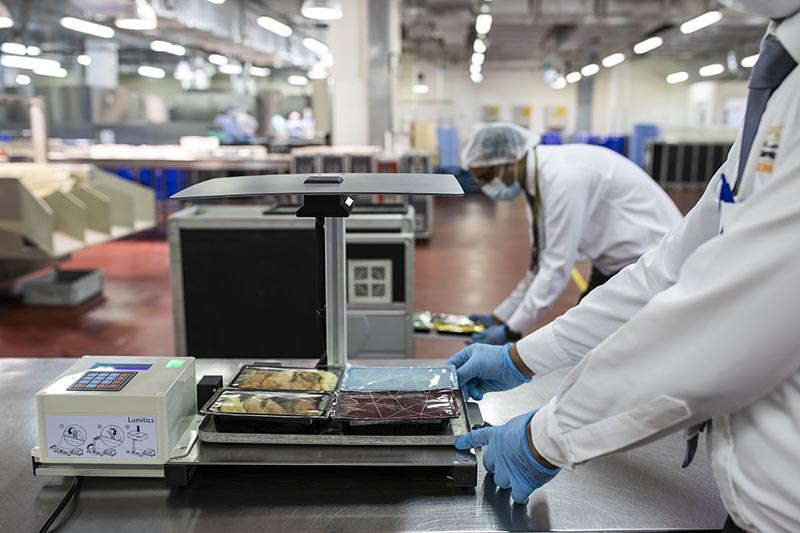Artificial Intelligence (AI) is revolutionizing the airline industry, transforming it into a more efficient and sustainable form. From optimizing fuel consumption to reducing food waste on flights, AI in the airline industry is playing a key role in the technological future of aviation.
Reducing Fuel Consumption with AI in Airlines
Fuel consumption is one of the biggest challenges facing the airline industry. With rising fuel prices and increasing environmental concerns, optimizing fuel consumption has become essential for the profitability and sustainability of airlines. AI in the airline industry is helping address this challenge in several ways. On one hand, airlines are using machine learning technology to optimize their route planning and improve fuel consumption efficiency. On the other hand, AI is also helping to monitor fuel consumption in real time and identify any inefficiencies that may arise during a flight.
Fuel Price Evolution

Reducing Food Waste with AI
In addition to optimizing fuel consumption, the use of AI in the airline industry is also helping to reduce food waste on flights. The aviation industry produces a significant amount of food waste, often due to overestimating the amount of food needed for a flight. Airline passengers generate about one kilogram of waste per person per flight, according to British research. This includes disposable cups and headphones, napkins, food wrappers, uneaten food, etc.
An article in the New York Times paints a bleak picture overall. This average of three pounds multiplied by 4 billion passengers per year results in a lot of trash. And while many critics will no doubt point out the futility of talking about onboard waste versus an airplane’s greenhouse gas emissions, there is some value in examining small practices to gain momentum to address larger ones.
Various awareness campaigns have emerged in parallel. These seek to get airlines to adopt measures to reduce the amount of uneaten food on flights. An example is the Change.org campaign by Bassanini (change.org/DesperdicioDeAlimentos) signed by more than 120,000 people to end food waste on flights.
AI is enabling airlines to improve their ability to estimate the amount of food needed for a flight, which translates into reduced waste and greater sustainability.

Source: Times Aerospace
Reducing Boarding Time with AI in Airlines
In addition to its impact on fuel consumption and food waste, AI in the aviation sector is also transforming the travel experience itself. Airlines are integrating AI into their customer service systems to improve passenger interaction and resolve issues more efficiently. For example, AI-based virtual assistants are helping passengers make reservations, resolve service issues, and provide flight information.
Another aspect in which AI is transforming the aviation industry is in the management of security systems. Airlines are using facial recognition technology and other AI-based security systems to streamline boarding. This is the case with Delta Air Lines, a U.S. airline that has already announced that passengers flying from Minneapolis-Saint Paul International Airport will have the option to board using facial recognition. The company claims that up to 2 seconds per passenger and 9 minutes total of boarding time are reduced.
It is estimated that in 5 years the use of passports will be replaced by facial recognition as pointed out by Sarah Samuel, IT Director of Amadeus Asia Pacific. She claims that with this system “if you didn’t want to talk to anyone, you can avoid it completely.” On the other hand, Jay Stanley, policy analyst at the American Civil Liberties Union, asserts that the U.S. Government “is using the extremely powerful and dangerous biometric face recognition, which really has the potential to become a serious control technology.”

Source: Courtesy of Delta Airlines – Forbes
Conclusion
In summary, Artificial Intelligence is transforming the aviation industry to make it more efficient and sustainable. In the coming years, airlines will seek technological advances based on the three challenges reviewed in this post: 1) Reducing fuel consumption. 2) Rationalizing food waste. 3) Streamlining processes such as boarding. If you are interested in learning more about how we apply technology in the aviation sector, don’t miss our success story with Lufthansa; we tell you how we created their Digital Hub in Barcelona!
Do you want to be part of the innovation in the travel sector?
Visit our site and sign up for the open positions to innovate the travel experience.


